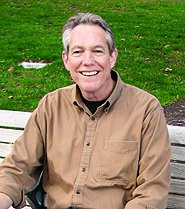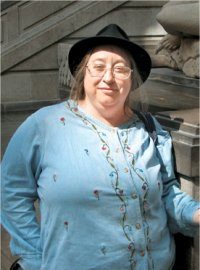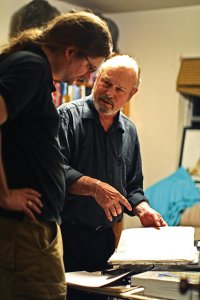Felix Gilman: Making the World Stranger

Felix John Gilman was born in London and grew up in the south London suburbs. He attended school in Seven Oaks, Kent, and read in history at Oxford for three years, then got a master’s degree in “Elizabethan stuff,” graduating in 1996. After working briefly for a small London publisher, he moved to the US to live with his wife Sarah. They resided in Washington DC for a couple of years starting in 2000, where he worked as a writer for a telecommunications business publication. He then attended Harvard Law School. He has worked for the federal courts in New York and in private practice.
First novel Thunderer appeared in 2008, followed by sequel Gears of the City (2009). A History of the Half-Made World, first in a new series, is forthcoming.
Excerpts from the interview:
“I grew up in Bromley, South London. Bromley is the location of large parts of Michael Moorcock’s The Dancers at the End of Time, as an archetypal incredibly dull London suburb. H.G. Wells grew up there, and he used it as his archetypal dull London suburb. I always read science fiction and fantasy, but I started writing relatively recently. (Well, in my early twenties I had various abortive efforts, but I never managed to summon up the energy to get much past five pages into anything.) Around 2006, I had a slightly odd situation in which I had six months to fill before I started a new job. I started trying to write legal academic things, a project which I then lost interest in, and I also started a fiction project. I thought, ‘I have six months, so I have absolutely no excuse for not sitting down and writing a novel.’ So I did.
“Because I didn’t have any substantial (fiction) writing experience when I started, I had no idea how much space any particular idea would take. I started Thunderer with a handful of ideas which were not fleshed out, and for about four months I shut myself up and worked on that. It was very much a learning-as-I-went-along process. I didn’t know what I was doing, but I produced a first draft that I gave to people, and later it went through at least two rounds of major revisions.”
*
“The gigantic city is obviously central to Thunderer. I don’t think I made a conscious decision that the book should be city-based. When I started writing a book, I just took for granted that it would be set in a city. I don’t know anything about what happens outside of cities.
“But if I had to reconstruct my subconscious motives (since you ask) I’d say the following. The things that interest me in world building are the entertainment or culture of the world, or the academy, or the newspapers: what are they like? Or the politics in the sense of the day-to-day ideas and ideologies and unexamined notions and slogans people carry around in their heads. And to develop these things through contrasts, through things knocking and rubbing against each other. The denser and more knotted the more interesting. Hence: cities. (I am not claiming success in this goal or even that the final product even aims as high as all that. But something like that was the drunk/manic-upswing pitch-to-self.)”
*
“There are different kinds of world building. There’s the kind that focuses on making the physical details real, and the texture of the culture the characters inhabit. That’s something I want to do, and I think it’s really interesting trying to create textured worlds in that sense — which is very different from the huge architectural level of deciding, ‘This goes here and this goes here; this is the continent with the elves, and this is what dragons do.’ (As a lawyer, I have written and then thrown away extensive passages on made-up legal systems. A little of that got in. Not much. Turns out there’s not much of an audience. Oh well.)”
*
“In September, I have something coming out from Tor which is very different. I didn’t want to write another city book, didn’t feel like creating another gigantic setting. And I wanted to try my hand at something which had a more straightforward plot. I’ve been accused of overplotting and underplotting, but this one has a clearer plot. It’s called A History of the Half-Made World (first of what will be either two or three books), and up to a point it’s like a fantastic western. It’s a purely invented world, though the fantastical elements are mostly limited to two weird and inhuman factions which sort of divide the world between them. They’re archetypes of something or other, probably. The book has the frontier theme, the theme of the founding and various falls from grace, but I don’t want to describe it as purely an American history thing, because that sounds like it’s more closely tied to American history than it is. It plays with certain tropes, let’s say.”
Read the full interview in the February 2010 issue of Locus.
 While you are here, please take a moment to support Locus with a one-time or recurring donation. We rely on reader donations to keep the magazine and site going, and would like to keep the site paywall free, but WE NEED YOUR FINANCIAL SUPPORT to continue quality coverage of the science fiction and fantasy field.
While you are here, please take a moment to support Locus with a one-time or recurring donation. We rely on reader donations to keep the magazine and site going, and would like to keep the site paywall free, but WE NEED YOUR FINANCIAL SUPPORT to continue quality coverage of the science fiction and fantasy field.





